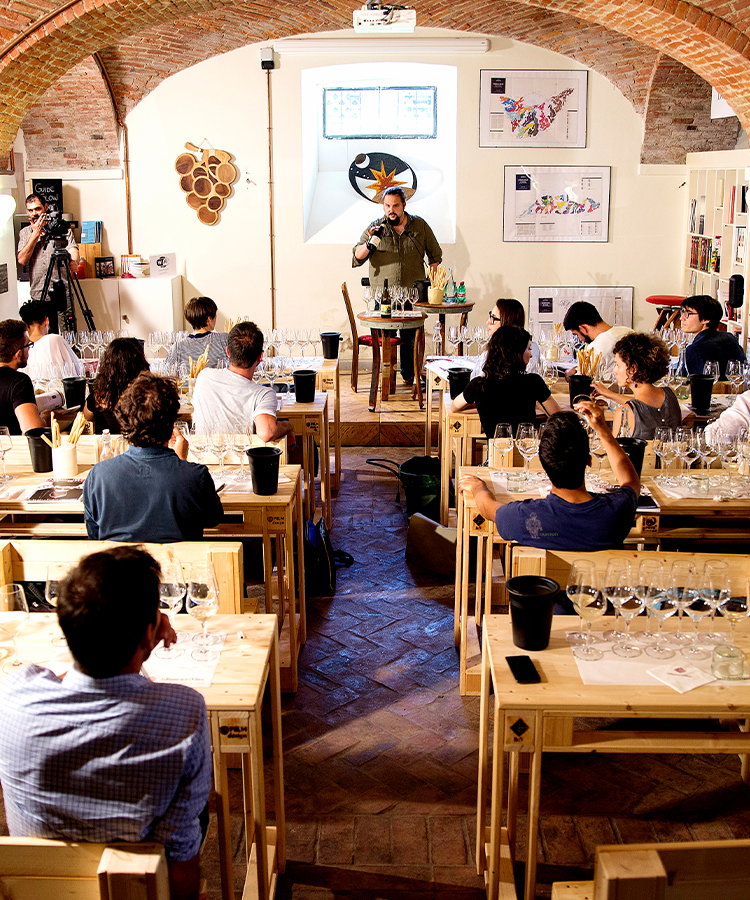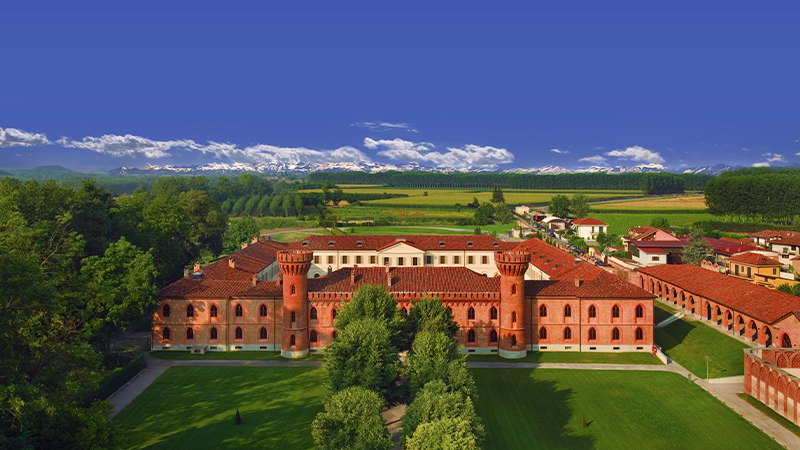
When is a school not just a school? When it’s also a movement. The University of Gastronomic Sciences (UNISG), located in historic Pollenzo, Piedmont, Italy, was founded in 2004 by visionary Carlo Petrini, 2013 recipient of the U.N. Environmental Award, to expand his work with the Slow Food movement, which promotes globally sustainable eating and cooking practices. But 18 years and thousands of graduates later from over 90 countries, and with eight intensive master’s programs focusing on everything from culinary arts to food geopolitics, it’s helped shape the next generation of food professionals and activists. “The most important education that I achieved throughout my studies at UNISG has been the values of ‘good, fair and clean’ — every day in my work, I try to always reach the best quality,” explains UNISG alumnus Giulio Antonio Pagni, co-creator of Giulio & Gaia Viticulture. Pagni worked in economics and business for years before pivoting to embrace his lifelong appreciation of gastronomy. “UNISG helped me address my passion for wine,” he says, noting that this education led him to create a business that prioritizes workers, the land, and sustainable quality — all captured within each handcrafted bottle.
Nestled among a UNESCO World Heritage Site dotted with ancient Roman ruins, in an area known for its truffle hunts, outstanding wines, and signature foods, UNISG offers hands-on educational opportunities. UNISG’s classes focus on the organic relationships between food, local ecology, and culture. Located near the Slow Food headquarters, the school also attracts prestigious visiting international scholars and workshops in the field of food studies, offering a dialogue between student research and the broader world of food. UNISG offers a peek at what immersive education can really offer students.
The World as a Classroom and Hands-on Dynamics
In forming UNISG, the goal was to cultivate an international research and education center that bridged gastronomy and agricultural sciences; to create a space where students could gain confidence through hands-on learning. Today, UNISG is about celebrating the idea that gastronomy is everywhere, from “every product of the land, the seas, and the forests” to representing “every cuisine, from the simplest and most domestic to the most refined.” That constructing a better future also meant preserving cultural heritage and nurturing the planet.
“The global community of friends, acquaintances, and colleagues I’ve made at UNISG is by far the best part of my experience at UNISG. Food brings people together in the sincerest and most genuine ways,” says a UNISG alumnus who now works at a boutique experience provider catering to global culinary travel. “If you’re not in class or field learning, you are around a table — studying, eating, conversing, brainstorming, cooking, laughing — learning from one another, enjoying each other’s company, and, of course, food.” She credits UNISG with teaching what it means to facilitate meaningful and ethical cultural exchanges, both at the dinner table and in the world of business and entrepreneurship.
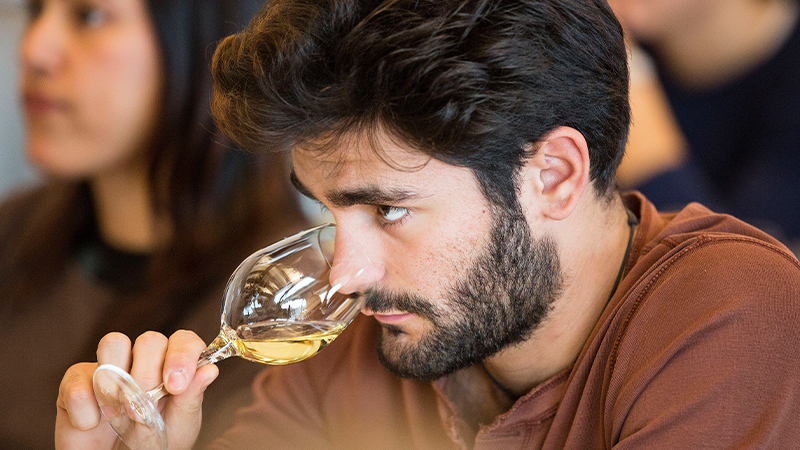
And she’s not alone in her experiences. As part of their research, all master’s students partake in field study trips throughout Italy and abroad, with excursions involving visits with artisanal producers, entrepreneurs, and restaurateurs. Bolstered by workshops and educational tours, students have studied with producers from Basilicata to Lazio, to Chile, Kenya, Malta, and beyond. According to students, these journeys give access to unique, critical, or often misrepresented gastronomic cultures, with a vision toward the complexities that characterize our global table.
Students Who Thrive
Many UNISG alumni go on to shine in their respective fields. Jess Pierce, who received her master’s in food culture and communication (2012-13), now works at the prestigious Walter Scott Wines in marketing and education, and produces her own label. Recent graduate Mia Frances Larocca (M.A. in gastronomy, world food cultures, and mobility, 2018-19) returned to the U.S. to pursue her dream job as the Lead Beekeeper at Alvéole, a Los Angeles-based company promoting the development of urban beekeeping. And award-winning cookbook author Maria Zizka, named by Forbes as one of the most influential people under 30 in food and drink, cut her teeth writing about sustainable cooking practices and local production for her M.A. in food culture and communications (2011-12).
“UNISG provided me with a more comprehensive global knowledge and insight into cuisines and cultures,” explains Laura DeOliveira, whose master’s in food culture and communications helped her land an internship with fellow UNISG graduate Johan Dal, the pair organizing the first-ever Terra Madre Nordic event in Copenhagen. She now works as community manager at the Good Food Foundation and credits the school with providing a “level of confidence in my expertise, which at this point revolves around understanding the sustainability of food from an ingredient and farm level and helping to vet businesses interested in our guild community.”
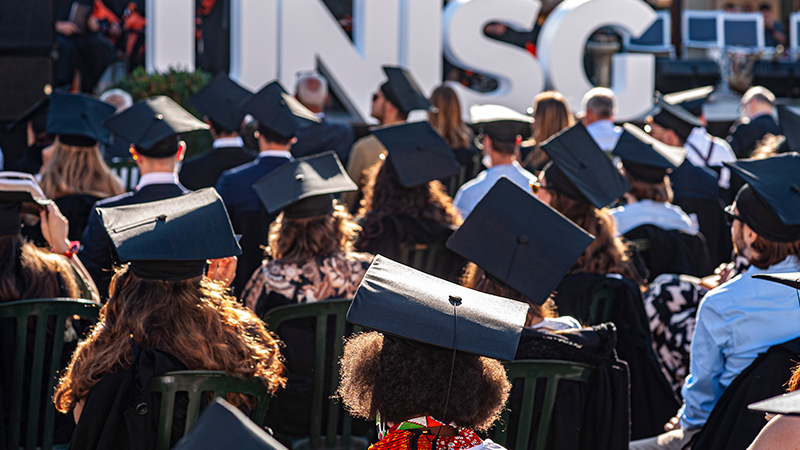
“I often get asked by other individuals interested in the program if it is worth it, and yes, the experiences and sense of community you get are incredible,” DeOlviera continues, noting she has made friends from across the globe and gone on life-changing adventures, from working on an oyster farm in Lauwersoog, Netherlands, to cheese tasting through Cambria. “The experiences I had during this time are permanently etched in my memory and live through me daily. I feel an immense amount of gratitude for UNISG for exposing me to all those opportunities.”
This celebratory spirit is also highlighted on the university’s Instagram profile, generated by the school’s community of students and ex-students, who visually narrate the UNISG under the hashtag #theunisglife.
“As a former student, this program is ideal for those who want to start a professional career in the food industry with a distinct and very specific approach towards the different dimensions of sustainability,” says Aarón Gómez Figueroa, manager, The New Gastronome Food Communication Agency & Magazine. “It doesn’t matter if you are a ‘foodie’ or focused on the planet’s food system’s well-being, marketing, or food policy. UNISG, as a university, has a diverse offering that provides answers and knowledge for all kinds of students.” He explains that UNISG has formed thousands of ‘gastronomes’ working at different levels and areas of the food industry who have gone on to improve the world of food no matter what their position. “That’s why the role of the university is so important. It creates a worldwide community, all in tune with the same values,” he says.
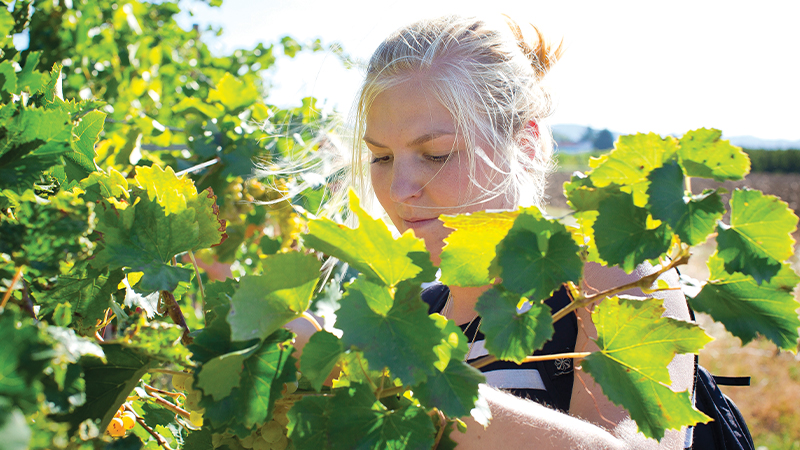
This article is sponsored by UNISG.
